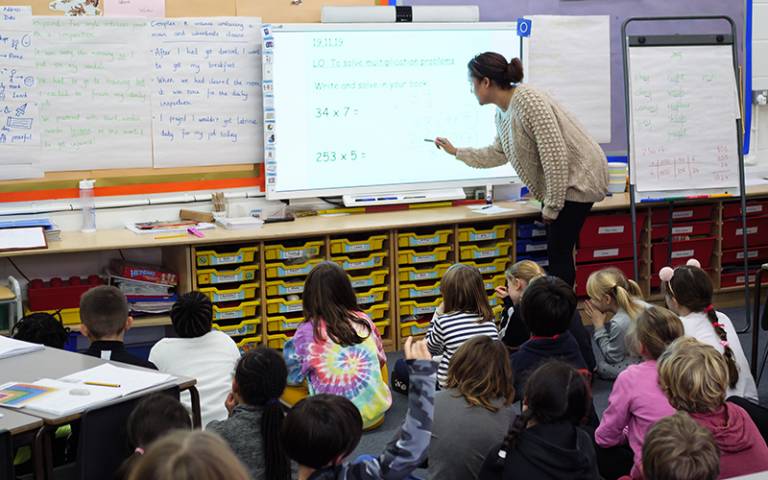Year 6 SATs and other government tests should be removed from primary assessment
1 November 2022
High stakes assessments should be replaced by a system that prioritises children’s learning rather than holding schools and teachers to account, recommends an independent commission co-chaired by researchers at IOE, UCL's Faculty of Education and Society.

The Independent Commission on Assessment in Primary Education (ICAPE) recommends that Year 6 SATs should be phased out while other high stakes assessments including Reception Baseline, the Phonics Screening Check, and the Multiplication Tables Check should be removed immediately, in a report published today.
The Commission, co-chaired by Professors Alice Bradbury and Dominic Wyse from IOE, UCL’s Faculty of Education and Society, concludes that the policies and practices of primary assessment are in urgent need of reform.
ICAPE was launched in May 2022 to review the role of assessment in primary schools and consider a new approach. Funded by the National Education Union, it took evidence from headteachers, teachers and researchers working in the field.
A survey carried out for the Commission found that 93% of educators and 82% of parents were unsatisfied or very unsatisfied with the system of statutory assessment. More than three-quarters of both teachers and parents agreed that there should be no government tests in primary schools.
Sharing the findings in an event held at the House of Commons today, the report recommends that current assessments should be replaced by more emphasis on teacher assessment. Further recommendations that would overhaul the current system include:
- A new system of nationally representative sampling of pupils, in order to evaluate the performance of the school system over time. should be developed. This would mean only a small number of children sit government tests.
- Proof of children’s learning and attainment across their primary education would be demonstrated by a profile of evidence that draws on a variety of assessment methods and reflects pupils’ wider achievements, as well as their performance in key subjects.
- Children in Year 1 and Year 4 would be assessed to identify gaps in learning and allow for improvements. Teachers would use these assessments to support a child’s learning and not to measure schools, as is currently the case. The assessments would be designed at national level and suitable to the individual needs of each child. The changes to the system would be developed in consultation with teachers, school leaders and subject experts.
Commenting on the recommendations, Dominic Wyse, Professor of Early Childhood and Primary Education and Director of the Helen Hamlyn Centre for Pedagogy (0-11 years) at IOE, said;
“This report shows there is a growing consensus that the current assessment system does not benefit children, and in fact can be detrimental to their mental wellbeing. The findings demonstrate the need to develop and then implement a much better assessment and curriculum system in order to deliver an exciting and balanced education that parents and teachers want, and children deserve. Crucially this will be an assessment system designed to help children's learning, not to judge schools' performance.”
Alice Bradbury, Professor of Sociology of Education at IOE, added;
“Our recommendations will ensure good practice in assessment and that standards are maintained and improved. Our research shows the need to move away from high pressure tests that only tell us how a child performs on a specific day. We recommend implementing more flexible assessments by
teachers that showcase a child’s successes and identify areas in which they need help. A key principle that emerged from the work of the commission was that assessment should be designed to support inclusive education for all children.”
Links
- Read the report: Assessment for Children’s Learning: A new future for primary education
- ICAPE
- Q&A with Professor Alice Bradbury
- Q&A with Professor Dominic Wyse
- Helen Hamlyn Centre for Pedagogy (0-11 years)
- Department of Education, Practice and Society
- Department of Learning and Leadership
 Close
Close

